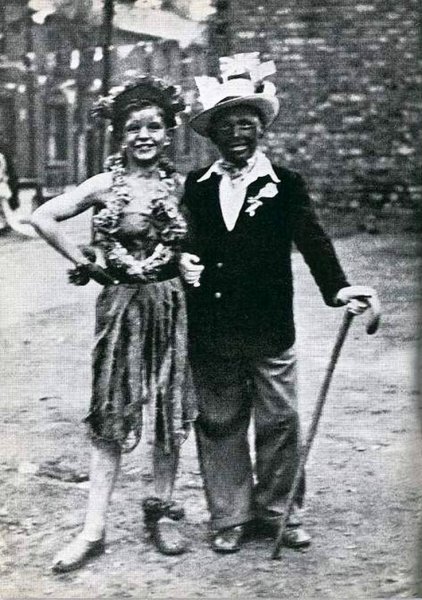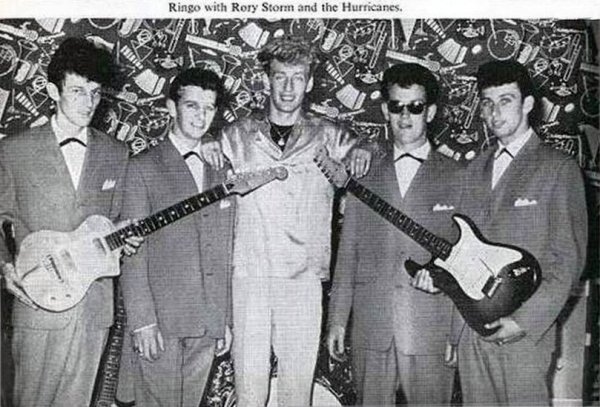Young Ringo - The fourth and last article on the Beatles' childhood days
YOUNG RINGO
The fourth and last article on the Beatles' childhood days Ringo’s achievement in becoming one of the four most famous entertainers in the pop world today is all the greater when one realizes the tremendous difficulties he had to overcome. As you all know, he was dogged by ill-health during his childhood. His mother says, “He was in hospital so much that he didn’t have the chance to do all the usual things that young boys get up to”.  His physical training instructor at Dingle Vale Secondary Modern School. Mr. Dawson, recalls, “He was always wanting to do the same things as the other boys, and I remember one incident which typifies this. It was during the middle of a P.T. lesson. All the class were jumping over the vaulting-horse in the centre of the gym. When it came to Ringo’s turn, he was obviously pretty doubtful whether he would get over the obstacle because he had never done it before. He ran up to it, jumped, and just managed to clear it. When he found that he had succeeded and not fallen flat, his face burst into a really broad, satisfied grin. His physical training instructor at Dingle Vale Secondary Modern School. Mr. Dawson, recalls, “He was always wanting to do the same things as the other boys, and I remember one incident which typifies this. It was during the middle of a P.T. lesson. All the class were jumping over the vaulting-horse in the centre of the gym. When it came to Ringo’s turn, he was obviously pretty doubtful whether he would get over the obstacle because he had never done it before. He ran up to it, jumped, and just managed to clear it. When he found that he had succeeded and not fallen flat, his face burst into a really broad, satisfied grin.
“Recently the school put an old desk of Ringo’s up for sale. We had thousands of girls queueing up to try and buy it. He has certainly helped to make Dingle Vale School famous."
Ringo’s mother remembers the first time he took an interest in drumming. “It was in 1957”, she says. "He was working in Hunt’s Sports’ Equipment store in Speke at the time, and he started a group, which they called the Ed Clayton Skiffle Group with his only really close friend at that ti me, Roy Trafford. Later on Ringo joined Rory Storm and the Hurricanes. He was playing with the Dark-Town Skiffle group at the time, and met Rory at a 6.5 Special Talent Contest. They got talking and Ringo found that Rory was short of a drummer. He gave Ringo a try, and shortly afterwards, the future Beatle became a permanent member of the group. The Hurricanes had just changed their name at the time. They used to call themselves the Roving Texans, and altered it because they started to play Rock instead of Skiffle. Iris Fenton, who also knew George and Paul around this time, recalls the boys were booked to appear at Butlins' Camp at Pwllheli and they decided that they would look more professional if they wore make-up. All except Ringo. He refused point blank to "put that muck on my face”. In the end, however, he gave in to stop the argument and smeared his face with a thin layer. She adds, “I remember that he was very popular with the girls staying at the camp. They all loved the grey streaks in his hair, even though Ringo hated them. “Rory thought a lot of Ringo and gave him his own spot in the act calling it 'Ringo Starr Time'. Ringo sang ‘Matchbox and Boys’. “He did not grow his beard until their second session at the camp in Pwllheli. I think it was to try and draw attention away from the streaks in his hair.” Iris’s mother, Mrs. Caldwell, remembers Ringo’s first swimming lesson. “Rory found out that Ringo could not swim a stroke so he decided to try and teach him. It was fine at first, but then they became more ambitious and decided to go under-water swimming which almost caused a tragedy. Rory told me that suddenly a pair of hands appeared from beneath the waves, desperately searching for something to grab onto. Ringo’s swimming obviously wasn’t good enough for undcr-water yet. Luckily Rory saw what was happening and pulled him out. "In 1961, Ringo was going very steady with a girl called Jerri. They were seen everywhere together and I believe the only reason that they broke it off was because Ringo refused to give up show business. “He was a constant visitor to our house and usually came home with Rory after they had finished playing. They used to sit there chatting forhours. But I seem to remember that it was Rory who did most of the talking while Ringo did most of the listening. Often they would sit there until the early hours of the morning, and occasionally even until dawn broke. "I remember that Ringo's moods used to vary a lot. Sometimes he’d be very happy and animated and other times miserable and depressed. But he had a very strong effect on all the others present and if he was feeling happy they all ended up feeling happy too. If he was sad then everyone seemed to be miserable. “He always seemed to be getting into scrapes. I remember the time he went to Hamburg for the first time. He travelled alone on the train and had to change in Paris. During the usual scramble he lost track of his drum-kit. He told me that he stood on the platform unable to speak a word of French and did his best to describe what had happened in sign language. The French people thought he was mad and called the Gendarmes. Fortunately, one of them did understand English, and realized what had happened. He still had to stay in Paris overnight, but his drums were found by next morning. "I know that from the very first time that he met them, Ringo admired John, Paul and George very much, and I think it was the biggest moment of his life when he was given the opportunity of playing with them on their first recording session. “It certainly changed his whole life and looking back on all the troubles that Ringo went through as a child I’m very glad that he has become so successful and famous.” 
|